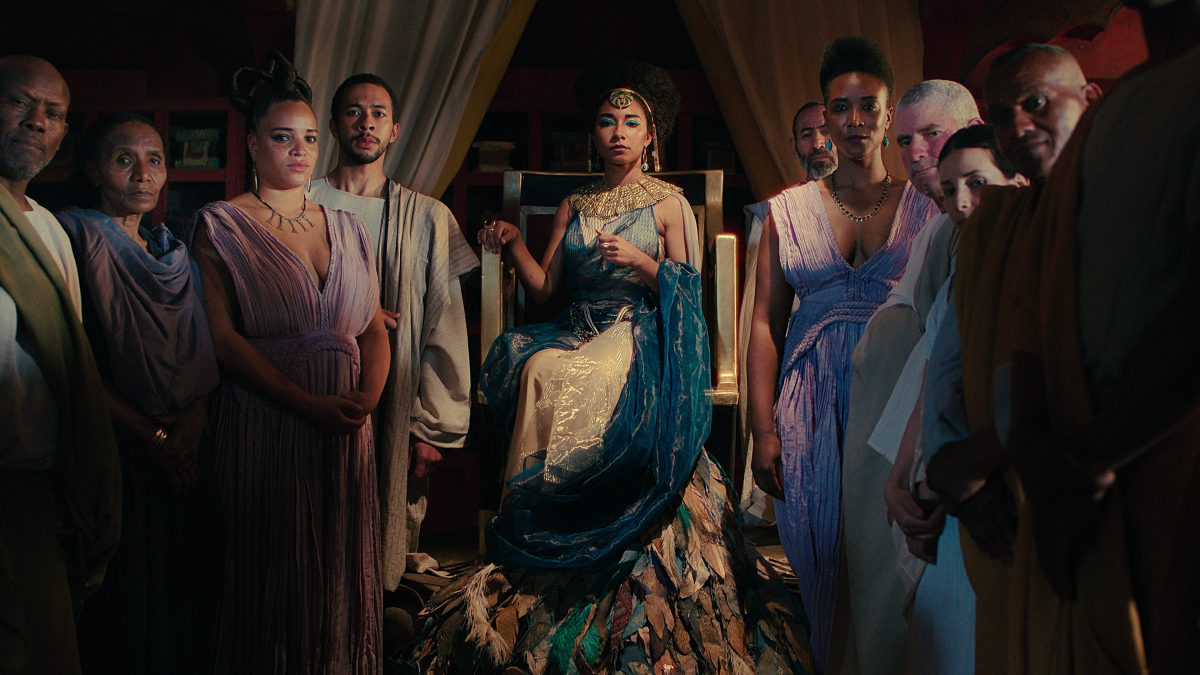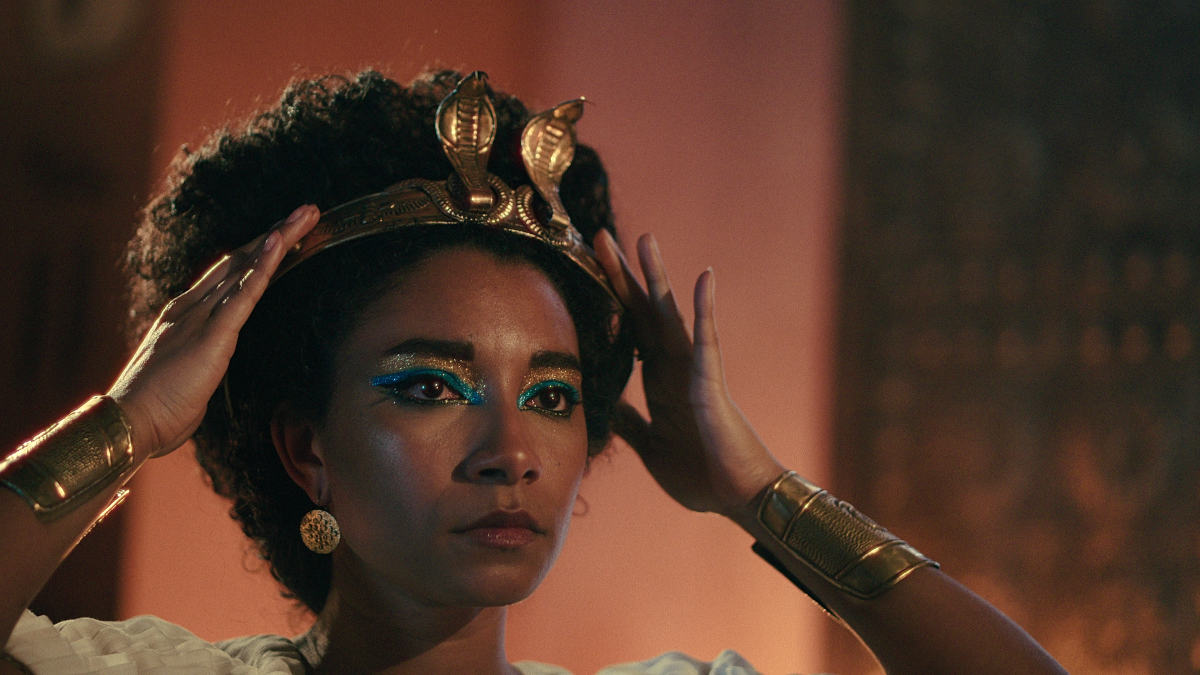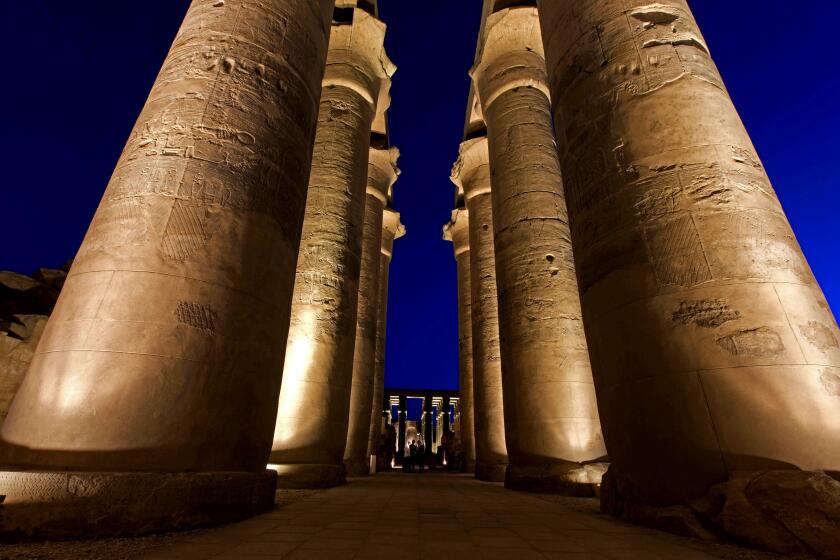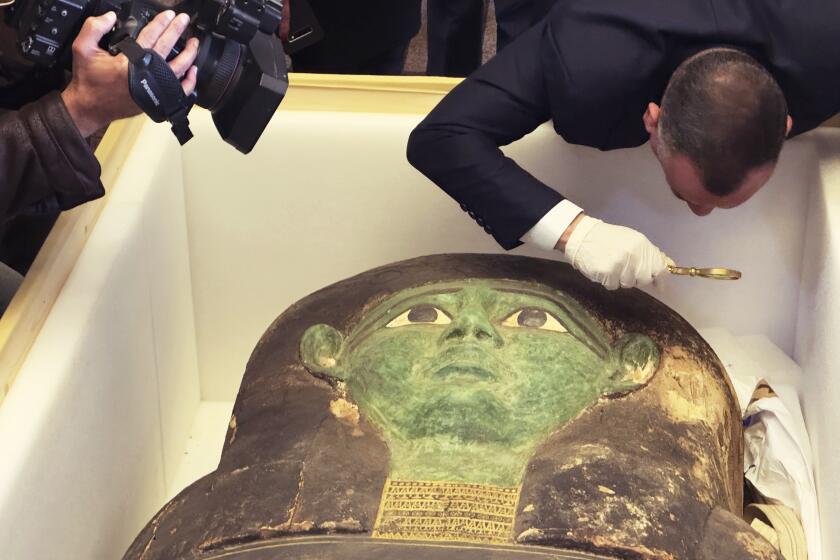After backlash to Netflix’s Black ‘Queen Cleopatra,’ Egypt plans counterprogramming

- Share via
Netflix on Wednesday finally released its polarizing “African Queens” docu-series “Queen Cleopatra,” which depicts the Egyptian ruler as Black. But Egypt has already launched counterprogramming plans to tell its own version of the Pharaonic ruler’s story using “the highest levels of research and scrutiny.”
Al Wathaeqya, the Egyptian state-backed Documentary Channel, recently announced plans to produce a documentary with the government-owned broadcaster, United Media Services — an apparent response to what some Egyptian critics called “historical revisionism” in “Queen Cleopatra” by Netflix and others.
“Starting as usual in all documentary production sector and documentary channel work, there are working sessions currently being held with a number of specialists in history, archaeology, and anthropology; to subject research related to the subject of the film and its image to the highest levels of research and scrutiny,” the channel said, according to a translation of its Facebook post.
Independent filmmaker and Egyptologist Curtis Ryan Woodside also posted a 90-minute English-language documentary about Cleopatra VII on his YouTube channel Wednesday, rejecting “biased” opinions and “misinformed,” modern and American iterations of the queen. The film discusses Egypt’s multi-racial society and features commentary from Kathleen Martinez, a Dominican archaeologist “in search of Cleopatra,” and Zahi Hawass, Egypt’s former minister of state for antiquities affairs who has vehemently opposed Netflix’s portrayal of the ancient ruler.
Hawass also railed Wednesday against Netflix’s documentary series — the “African Queens” collection is produced by Jada Pinkett Smith — during an Arabic-language interview on Egypt’s MBC network. He said that when he gives lectures in the U.S., he has been confronted by Black demonstrators calling him a liar. But he said he believes they have “disorganized thinking” when it comes to ancient Egypt, which is his field of expertise.
He also reiterated in the interview that the only Egyptian rulers known to have been Black were the Kushite kings of the 25th dynasty (747-656 BC), and he pushed back against Black Americans who have claimed that the Egyptian civilization has Black origins and are “obsessed” with the colonization of Egypt throughout its history. He also hoped Netflix would also stream the documentaries about Cleopatra that he has worked on. (The Al Wathaeqya channel also recently acquired Hawass’ “Roots of Ancient Egypt,” scheduled to air in May.)
Netflix’s ‘Queen Cleopatra’ director defended the series in a Friday essay following allegations of ‘blackwashing’ and falsifying ancient Egyptian history.
Cleopatra was born in the Egyptian port city of Alexandria in 69 BC and succeeded her father in 51 BC to rule until her death in 30 BC amid the expansion of the Roman Empire. Egyptologists have confirmed that she was Macedonian-Greek on the side of her father, Ptolemy XII, but her maternal heritage is less clear; little is known about her birth mother’s ethnic origin. Historians have said it’s possible that she, or any other female ancestor, was an Indigenous Egyptian or from elsewhere in Africa.
“Queen Cleopatra” splices dramatic reenactments of the ruler’s stories with expert interviews. It sparked a backlash in the North African nation for casting mixed-race British actor Adele James as the Pharaonic ruler — the last queen of the Greek-speaking dynasty founded by Alexander the Great’s Macedonian general Ptolemy.
The casting decision, and James’ appearance in the trailer last month, further ignited the long-debated discourse about Cleopatra’s maternal heritage, with many people taking issue with her potential Black heritage being presented in the documentary series as factual record rather than a theory.
Last month, Egyptian lawyer Mahmoud al-Semary filed a complaint with Egypt’s public prosecutor to request that Netflix be blocked in the North African nation due to the promotion of “Afrocentric thinking,” including “slogans and writings aimed at distorting and erasing the Egyptian identity.” His efforts didn’t succeed; Netflix was still accessible Wednesday in Egypt, and “Queen Cleopatra” was available to stream.
On April 30, the same day Al Wathaeqya announced its plans for the documentary, the secretary-general of Egypt’s Supreme Council of Antiquities stated that showing Cleopatra with African features and dark skin in the Netflix docu-series “is considered a falsification of Egyptian history.”
“Statues of Queen Cleopatra confirm that she had Hellenistic (Greek) features, distinguished by light skin, a drawn-out nose and thin lips,” the council said, tweeting photos of busts and coins depicting the queen.
And comedian Bassem Youssef, the exiled political commentator once regarded as “Egypt’s Jon Stewart” who appeared in Netflix’s “Mo,” criticized Hollywood’s misrepresentations of Egyptians during an appearance on “Piers Morgan Uncensored,” during which he accused filmmakers of appropriation and trying to “take over our Egyptian culture.”

”Queen Cleopatra” director Tina Gharavi defended the series’ casting decision last month in an essay for Variety, arguing that the queen looked more like James than Elizabeth Taylor, the actor who famously played the ruler in Hollywood’s Oscar-winning 1963 epic “Cleopatra.”
“Why shouldn’t Cleopatra be a melanated sister? And why do some people need Cleopatra to be white? Her proximity to whiteness seems to give her value, and for some Egyptians it seems to really matter,” the Persian director wrote, adding, “Perhaps, it’s not just that I’ve directed a series that portrays Cleopatra as Black, but that I have asked Egyptians to see themselves as Africans, and they are furious at me for that. I am okay with this.”
After losing my mother, I’ve learned new rituals can help us deal with the heavy weight of grief. My daughter will find her own.
James, who was trolled on social media about her casting and told people not to watch the series if they don’t like it, dismissed the backlash Wednesday while promoting the arrival of “Queen Cleopatra” on Netflix. (The series landed on the platform just days after the drama “Queen Charlotte,” the “Bridgerton” prequel that depicts the queen of England as Black.)
“l am so, so, so excited for you to take a deeper dive into this incredible woman’s life — all 4 eps are available to stream right away. Feeling like the luckiest lady in the land today #QueenCleopatra #Cleopatra #CominAtcha,” she tweeted.

She also appeared on “The Wayne Ayers” podcast, calling the Egyptian litigation in response to the series “quite funny.”
“The level of threat that you must feel, just on my skin tone, to file a lawsuit against an entire streaming service, that to me is really extreme ... and it’s 100% fundamentally rooted in racism. Which is a very modern ideology,” she said. “The ancient Egyptians, they don’t think about race the way we do. Because race has only really been contextualized as we understand it since the transatlantic slave trade. That’s just not how people thought back then. It’s really bizarre, but to me, again, I just find it very sad.”
Netflix declined to comment on the backlash Wednesday.
Authorities in the U.S. determined that the ancient wooden sarcophagus, which was featured at a Houston museum, was looted from Egypt years ago.
Incidentally, the documentary series doesn’t delve deeply into Cleopatra’s race, instead focusing more on her reign as the first Ptolemaic ruler who learned the Egyptian language and practiced the religion too — and the nation’s final Pharaonic ruler before it fell to the Roman Empire in 30 B.C.
Discussion of her race arrives early in the first episode, when Hamilton College classics professor Shelley P. Haley asserts — as she did in the trailer — that her grandmother told her that Cleopatra was Black. Even then, Haley soon says that “we don’t know her exact racial heritage” for certain. Before the series debuted, Cleopatra scholar Sally-Ann Ashton, who worked with producers and appears in the series, said the project was meant to “explore Cleopatra’s story as a queen, strategist [and] ruler of formidable intellect,” not her race.
“Her ethnicity is not the focus of ‘Queen Cleopatra,’ but we did intentionally decide to depict her of mixed ethnicity to reflect theories about Cleopatra’s possible Egyptian ancestry and the multicultural nature of ancient Egypt,” producers told Netflix’s companion site Tudum in April.
“If you look at her depictions, she looks different, depending on who it is that’s depicting her. So her representations change, her perceptions change. So it’s almost like this chameleon,” added Debora Heard, a PhD candidate in Nubian archaeology and Egyptian studies, in the first episode.
Another scholar in the docu-series, Islam Issa, also tells viewers that the appeal of Cleopatra is “that everyone can imagine her in their own way.”
Archaeologists such as Monica Hanna, an Egyptologist who argued in a viral Facebook post that “Egyptians were all colors” and that ancient Egypt “was more of a culture than it was a race,” reiterated that Cleopatra “did not leave us with anything to clearly state how she herself identifies,” so it cannot be said with certainty whether she saw herself as Egyptian or more Ptolemaic.
“[S]ticking to one identity and rejecting other identities and the cultural pluralism that makes Egypt, Egypt is a real impoverishment for us,” she wrote.

More to Read
The complete guide to home viewing
Get Screen Gab for everything about the TV shows and streaming movies everyone’s talking about.
You may occasionally receive promotional content from the Los Angeles Times.










